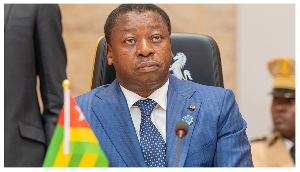Business News of Saturday, 12 April 2003
Source: gna
Companies to invest over five billion dollars
Eighty-nine companies operating in various fields in Ghana intend to increase their investments by more than five billion dollars over the next three years, consultants of United Nations Industrial Development Organisation (UNIDO) have said.
The companies were among 97 respondents interviewed in a UNIDO Survey of Foreign Investors in Ghana. The survey, which measured the views of existing Foreign Direct Investment (FDI) investors in Ghana and success of their investments, is to assist the Ghana Investment Promotion Centre (GIPC) to improve FDI flows.
At a meeting to present the results of the survey in Accra, a UNIDO consultant, Mr P.J. Daly, urged the GIPC to focus their activities to actualise the planned investment.
The pilot survey conducted in July to September last year also measured Ghana's competitiveness as an FDI destination on the regional market.
Most firms, Mr Daly said, mentioned Ghana as their preferred location for their future investments when asked about it. Nigeria ranked next, followed by La Cote d'Ivoire.
The design of the questionnaire followed a previous UNIDO exercise that covered Ethiopia, Nigeria, Uganda and Tanzania.
Data obtained from the previous study was, consequently, used as a benchmark against which the information obtained in Ghana could be measured.
Mr Daly said when firms were asked to explain the main reasons why they invested in Ghana, 20 per cent of them mentioned access to the local Ghanaian market as the strongest factor.
This, he said, was slightly below that in the other four countries, which was 23 per cent.
However, he said, better economic conditions in Ghana contrasted strongly in its favour for FDI than in the other four countries.
He said: "A total of 14 per cent of FDI investors gave this as a reason for investment as against 2.3 per cent for the others. This should be a strong point for FDI since it is one of the largest differences between Ghana and some of its competitors."
On investor performance and expectation, Mr Daly said the overall pattern appeared to be in Ghana's favour, where more firms reported that their investments performed ahead of expectations relative to the other four countries.
"On balance, the contrast is in Ghana's favour, but not spectacularly so," he said.
However, Mr Daly said FDI firms in Ghana were somewhat less optimistic about growth prospects over the next three years. Forty per cent of the firms expected a low growth of sales (less than 3 per cent) over the period as against 30 per cent for the other four countries.
Explaining the shortfall in performance, the firms said quality of products selling in the market place with the cost of labour contributed to this situation.
Mr Daly said Ghana did not score so well on the issue of incentive package, which was cited by only five per cent of investors as against nearly 11 per cent among the others.
On the relationship between Investment Promotion Agencies (IPA) and the FDI Community and how the companies learned about opportunities to invest, he said, though IPAs in Ghana appeared to be more influential than their counterparts elsewhere, existing investors were the most single channel through which the investor learned about the opportunity.
"The lesson to be drawn is that satisfied investors will in turn become good ambassadors for Ghana. Dissatisfied investors on the other hand will have the opposite effect."
Mr Daly, therefore, advised the GIPC to improve on its relations with the FDI community and actively involve them in their promotion programmes.
He stressed that changing the negative perception about doing business in Africa should be prioritised and using testimonies from people with experience on the field would significantly help.
Mr Kwasi Abeasi, Chief Executive of GIPC, said the issue would be given priority though a previous attempt to get the government to include some business people on an investment trip was not favourable considered.
He said Africa's share of less than one per cent of international FDI over the years was worrying in view of the structural improvements in the economy, political environment and attainment of the rule of law in several African countries.
He said the GIPC's five-year corporate plan would be ready next week, while the survey and the result of other surveys of the cost of doing business in Ghana and barriers to FDI in Ghana would be harmonized to make the GIPC more effective as a one-stop shop for investment promotion.










